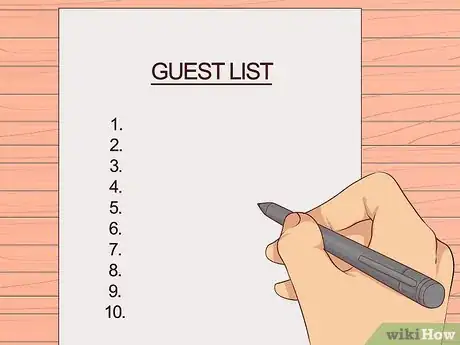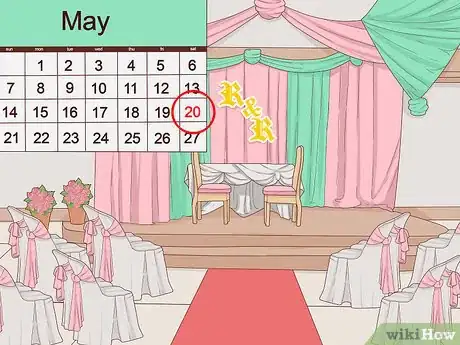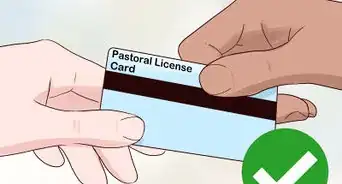This article was co-authored by Stefanie Chu-Leong. Stefanie Chu-Leong is the Owner and Senior Event Planner for Stellify Events, an event management business based in the San Francisco Bay Area and California Central Valley. Stefanie has over 15 years of event planning experience and specializes in large-scale events and special occasions. She has a BA in Marketing from San Francisco State University.
There are 10 references cited in this article, which can be found at the bottom of the page.
This article has been viewed 598,751 times.
If a small private wedding is what you and your fiancé want, run with it by having a private affair to remember. Weddings may traditionally be considered a time of grand celebration, unexpected expenses and large guest lists, but it is a couple’s personal decision to have a large celebration or a simple private event. With the proper planning and execution, you can have the small private wedding you've always wanted.
Steps
Managing Expectations of Family and Friends
-
1Be ready to conquer hurt feelings. It will be difficult to pull off a small wedding without stepping on anyone’s toes. Take the bull by the horns and explain to any offended would-be guests that you love them and you appreciate their support but not all their requests can be accommodated.[1]
- Express sympathies to your offended family. Always be compassionate and apologetic. Explain that it wasn’t your intention to offend and let anyone who feels offended know you value them not only as a person, but you also value their desire to be supportive on your special day.[2]
- From the get go, you can offer clues that it will be an intimate affair by saying things like, “we decided to go with a smaller venue” or "our budget is pretty minimal." This will help manage expectations before any potentially uncomfortable confrontations.[3]
-
2Handle your momzilla with compromise. Your mom’s dream wedding might include triple your guest list and an expensive menu. Keep your guest list down by allowing compromises loaded in your favor. For example, let your mom know you can accommodate your Great Aunt’s sister in law, but in exchange you can’t send invitations to your dentist’s entire family.[4]
- Take the blame for mom. If she feels your wedding will be the talk of the century with it’s short guest list, allow her to blame it on you. For example, she can tell her friends that you’re a force to be reckoned with, and your obscene wedding plans are completely out of her control. If she’s embarrassed by your lack of guests, this will help temper it down.[5]
- Keep mom feeling busy and important. If you don’t care for wedding favors, allow her to take the project on as her own. Give her near full control of the project but still express the value of the responsibility she has taken. No one wants to be given busy work.
Advertisement -
3Know your plan and be firm. When it comes to weddings, friends and family may act as if their opinion is more important than yours. Always remember that this is not the case. You and your future husband are the sole decision makers for your upcoming wedding. Planning tantrums can be avoided by carefully discussing intentions at the beginning of planning.[6]
- Consider using a wedding planner. A wedding planner may seem like an expensive and unnecessary addition to the budget, but they will have insider connections to venues, caterers and florists. More importantly, they can be your wedding anchor and help deal with difficult in-laws and parents. Wedding planners are professionals are diffusing tense situations in stressful times.
- Give the vendors a heads up if you think your family may go behind your back. This will prevent anyone from being able to make any changes to the menu, music playlists or photo scheme.[7]
Planning your Wedding
-
1Create your wedding budget. Start with what extra money you have and plan out how much you can save to help you decide what kind of wedding you want to have. Your budget is key in deciding how many guests will be at your wedding. If your budget and desired wedding don’t correspond, you can have extra saving time by setting a later date. After you make your initial budget, don’t be afraid to re-work the numbers. Budgets should be flexible between both partners.
- Use a wedding worksheet to consider all things you might miss, such as transportation to and from venues, and bridal party gifts.[8]
- Ask around for help. Your parents or family may want to contribute cash to help fund the wedding, so communicate your expectations before accepting. Be cautious, however, as accepting the money may be conditional for allowing them to make wedding-related decisions, such as lengthening the guest list. It’s important to discuss your wedding-wants before accepting the cash to ensure everyone is on the same page.[9]
- Keep a prioritized list of what’s a must-have to you. The list will help you stay on track and build an appropriate budget. If wedding budgets are stressing you out, take a moment to remember they are in place to help keep on you on point and not regret any decisions later.[10]
-
2Build your guest list. Use a tier system to determine your numbers. Start by making a first tier list of must have people. The first tier should include close family members. Next, build a second tier of people you would like to invite. The second tier would include friends and close co-workers. The third and final tier is the list of individuals you should invite, but perhaps don’t need to. For example, this would include your distant cousins and family acquaintances. Use the first tier as a jumping point for your guest list and add to your list accordingly. Be cautious in keeping these lists private to avoid hurting anyone's feelings.
- Pick your wedding party. They will be vital to your special date and must fit within the guest list. Don’t feel obligated to pick only from your first tier list but rather choose based on both friendship and also function. If your best friend is soft-spoken and timid, she may be better placed as a bridesmaid while your well-liked, headstrong cousin is a more functional maid of honor.
- If your guest list is spiraling out of control, consider not inviting to children under 12. This can be especially helpful if you want to have a stylish, black-tie event not suited for children. Not inviting children will discourage many out-of-town relatives from coming to the wedding and if you feel strongly about having the parents there, offer childcare providers to take care of all the children together.
-
3Choose a date and a venue. When choosing a ceremony and a reception location, account for travel time and inconvenience between the two.[11] Don’t be shy about visiting locations. If you are unsure if you would like a garden, church, or hall wedding, visit all three. Visitations are free and may give you new perspective on what's possible.
- Before signing the paperwork for your venues, determine if it can hold your guest list. A venue for several hundred people may not be the best location for an intimate wedding. Also, check for rules surrounding bar services, decorating and catering, to avoid any miscommunications and conflicts closer to your wedding.
Executing the Plan
-
1Send out your invites. In order to avoid potential awkwardness, ensure to title the invites only to the intended guests. For example, if you’re not inviting children, title the invite “Mr & Mrs Smith.” This gives a clear indication of who is invited.
- Include clear instructions on how-to RSVP. This includes what date to respond by and how. Consider sending postage-paid envelopes or setting up an e-RSVP to save time for yourself and your guests.
- Stay on top of your RSVP list. Whether you ask your betrothed or a member of the bridal party to maintain the list, it’s important to know how the number of guests is looking. If you’re somehow ending up with more guests than intended, it’s better to approach the self-invited guests sooner rather than later.
-
2Delegate tasks to your wedding party. Having a stress-free wedding is all about delegating, delegating, delegating, and the wedding party is there to help, not to just look pretty. When your bridal party comes to mind, assign tasks related to interest. If you’ve got a friend that can cook up a storm, invite her to the food tasting. Perhaps you have a gal pal that can turn a streamer into a work of art, ask her to help decorate.
- Up the ante by asking your fiance and the groomsmen to help. Rather than assuming they don’t want to intrude on your domain, ask them to ensure your day remains exactly that. Suggest they plan transportation for the day, assist in decorating venues, or run small errands like dry cleaning and flower pickup.
- Menial tasks such as closing envelopes or cutting up invitations can be easily turned into a fun party. Invite your wedding party over for some low-stress pizza, and tackle a hefty list as a group. You’ll find that with a team of helpers you’re able to whittle down an overwhelming list in no time.
EXPERT TIPStefanie Chu-Leong is the Owner and Senior Event Planner for Stellify Events, an event management business based in the San Francisco Bay Area and California Central Valley. Stefanie has over 15 years of event planning experience and specializes in large-scale events and special occasions. She has a BA in Marketing from San Francisco State University.Owner & Senior Event Planner, Stellify Events
 Stefanie Chu-Leong
Stefanie Chu-Leong
Owner & Senior Event Planner, Stellify EventsHow can I handle an overbearing mom while wedding planning? Give your mom an assignment that you know she will be excellent at, like helping with the cake or planning the food for the rehearsal dinner. Give her one task that she can make her pride and joy so that she feels like she's involved, and no one is leaving her out.
-
3Follow your stomach on the caterer. When it comes to picking food and alcohol for a wedding, you won’t regret choosing the option you like best. After you have finality on your guest list, determine what kind of food you’d like to have. Be cautious on choosing foods guests may be sensitive towards. For example, you may love raw oysters, however the rest of your family may not. Recruit a team of people for sampling foods to ensure there’s something for everyone.
- Don’t forget about the budget. Catering can be one of the most expensive lines of the wedding budget. It can easily be blown out of proportion so it’s best to keep a tight lid on it.[12]
- Know the rules of your municipality and venue. Many places require special permits for alcohol and you don’t want to be stuck trying to sort out a permit at the last minute. Venue’s can also have tight rules, such as requiring in-house bartenders and servers. Manage your expectations but inquiring about every activity that you're planning.
Enjoying the Party
-
1Spend quality time with your fiancé. Don’t let your wedding planning add stress to your relationship. Take time to de-stress together. This can be as simple as walking the dogs together or going to the spa.[13] Either way, your fiancé is only your fiancé for a short period, so enjoy them while it lasts.
- Allow time to indulge. With a full plate of wedding planning, work, and the rest of your life, it can be easy to let time get away from you. If you’re finding you’re too busy to fit fun into your schedule, schedule it in. Pick a day in advance and take time to do something fun together while forgetting about the wedding for the time being.
-
2Encourage the guests to take part. A wedding speech is a way for you to sit back and relax while having a fun laugh, meaningful cry and hopefully memorable surprises. Don’t hesitate to ask for speeches from your guests. It’s a sure way to make the guest feel valuable.[14] It doesn’t need to be limited to speeches, either. Before the big date, ask someone close to you to do a special dance, since a song or make a picture slideshow.
- Be cautious not to put pressure on the guests. While some guests may feel comfortable with public speaking, some may not. A forced speech is a failed speech and will surely end up with uncomfortable moments for you, your bride/groom and your guests.
-
3Kick back and unwind. When the day is here, breathe and release. This is what you’ve been planning for months, so you’d better drink that expensive wine and eat that expensive food. Mingle with your guests and eat a second piece of cake. Don’t worry about any stress, as it will be over the next day.
- Don’t sweat the small stuff. Maybe it rained in your pictures or the food was late. Try not to get worked up over things that were out of your control. This can put you in a bad mindset and you don’t want to be cranky the night of your wedding.
- Change those heels for more comfortable shoes. Having an intimate wedding means that you’ve got a small amount of guests to interact with. Get out there, talk to them and watch them enjoy your hard work.[15]
- Select a male and female host to deal with any social faux-pas. If you think you might have a creepy cousin or a wine-happy aunt, delegate an affable friend or family member to help deal with any awkwardness. Having picked someone in advance to de-escalate any conflicts means you can relax and enjoy yourself, rather than worrying about playing therapist to your guests.
Community Q&A
-
QuestionWhen should I send out invitations?
 Community AnswerWedding invitations should be sent out about 8 weeks before the wedding.
Community AnswerWedding invitations should be sent out about 8 weeks before the wedding. -
QuestionIs it okay for a teenager to ask an older relative (25) to dance or get a lap dance or grind with them?
 Michila LalamaCommunity AnswerNo, that is not okay. The teenager needs to be at least 18 years of age in order to do that.
Michila LalamaCommunity AnswerNo, that is not okay. The teenager needs to be at least 18 years of age in order to do that. -
QuestionI just got engaged yesterday, and I am not sure when to start planning my wedding. Any advice?
 Community AnswerThis depends on the date of the wedding. Speak with your fiance. Figure it out together. You are about to promise to spend the rest of your lives together, after all. It is never a bad idea to start planning as soon as possible.
Community AnswerThis depends on the date of the wedding. Speak with your fiance. Figure it out together. You are about to promise to spend the rest of your lives together, after all. It is never a bad idea to start planning as soon as possible.
References
- ↑ http://justmarry.com/weddingetiquette101/
- ↑ http://justmarry.com/weddingetiquette101/
- ↑ http://www.realsimple.com/magazine-more/inside-magazine/life-lessons/weddings-ettiquette/planning-small-wedding
- ↑ http://www.realsimple.com/magazine-more/inside-magazine/life-lessons/weddings-ettiquette/planning-small-wedding
- ↑ http://www.realsimple.com/magazine-more/inside-magazine/life-lessons/weddings-ettiquette/planning-small-wedding
- ↑ http://www.telegraph.co.uk/women/womens-life/10877340/Why-mothers-can-turn-weddings-into-a-nightmare.html
- ↑ http://www.huffingtonpost.com/sandy-malone/dont-let-momzilla-ruin-your-wedding_b_1629333.html
- ↑ http://www.realsimple.com/weddings/budget/wedding-budget-worksheet
- ↑ http://www.brides.com/wedding-answers-tools/wedding-timeline-budget/2009/06/how-to-create-a-wedding-budget
- ↑ http://www.brides.com/wedding-answers-tools/wedding-timeline-budget/2009/06/how-to-create-a-wedding-budget
- ↑ https://www.theknot.com/content/intimateweddings
- ↑ http://bridalmusings.com/2013/05/top-tips-for-wedding-caterer-kalm-kitchen/
- ↑ https://www.insideweddings.com/news/planning-design/6-tips-for-surviving-the-week-before-the-wedding/1546/
- ↑ https://www.insideweddings.com/news/planning-design/6-tips-for-surviving-the-week-before-the-wedding/1546/
- ↑ http://www.todaysmodernbride.com/644-tips-stress-free-wedding.html
About This Article
Small, private weddings can be more intimate, allow you to spend more time with your guests, and require less coordination. Narrowing down your guest list will be one of the hardest parts, but if you stick to close family and friends, you should be able to keep the numbers down. It’s natural for people who don’t make the cut to be a little offended, but try to explain your reasons for having a smaller wedding and let them know you appreciate their friendship. Once you’ve decided on the guestlist, choose a venue and wedding date that works for you and your guests. Then, send out your invites and work out the smaller details, like the catering, decoration, and entertainment. For more tips from our Wedding Planner, including how to write a budget for your big day, read on!








































































